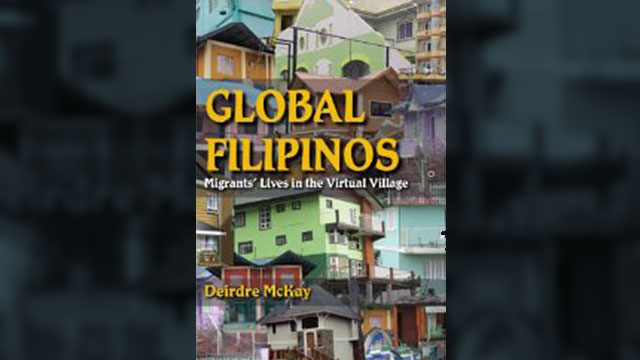SUMMARY
This is AI generated summarization, which may have errors. For context, always refer to the full article.

In her book Global Filipinos: Migrants Lives in the Virtual Village (2012), Dierdre McKay tracks the movement of members of a family from the village of Haliap, Ifugao Province, to Hong Kong and then Vancouver.
She notes how much her subjects longed for “home” as they traverse the world of the OFW. At first glance this is not really unique; it is the most common sentiment among those of us who had to leave home for work to support our families.
But what is interesting here is that “home” to McKay’s subjects was not the Philippines, but Haliap. They missed the village, not the nation; friends and relatives not fellow citizens. While they would eventually become alienated from their own community as relatives and friends treated them as mere sources of largesse, these OFWs resorted to the cyber-world to try to bring back memories of the village they left behind. We see no evidence of a parallel soulful longing for “the Philippines.”
McKay attributes this to the OFWs’ negative experiences with the corruption and inefficiencies of the national government and local officials which made their lives so miserable that their only choice was to go abroad to survive. But what patronage politics and corruption have also done is undermine their sense of nation. Their patriotism could not be enriched because the nation’s institutional representatives are seen doing the opposite of what is expected of them as leaders. To whom then do these villagers extend their fidelities and support?
But the estrangement is not just because of politics. A closer look at her subjects’ pilgrimage shows a particular geographic quirk: Manila hardly figures in the constantly moving world of the OFWs. Manila is the site where working visas to Hong Kong and Canada are applied for, but it is not a place where one wants to stay longer.
Once the visas are approved, OFWs could not wait to leave the metropolis and return to their communities. Where the national capital is acknowledged, it is only as a transit point between village and work destination.
You get to sense that a migrant worker does not even leave the airport terminal when she transfers airlines. She leaves Vancouver’s International Airport, transfers planes in Hong Kong, lands at the Ninoy Aquino International Airport, walks to the domestic terminal for the flight to Laoag. She lands in Laoag airport and is met by the family. They eventually reach the village, and she walks up the stairs of the family house where she can finally relax and enjoy the feeling of being home. (READ: How airports are the happiest and saddest places on earth)
Benedict Anderson invokes Jose Rizal’s wonderful “spectre of comparison,” to explain the beginnings of a sense of nation among the ilustrados. McKay’s OFW however may see something else. There is little if no Rizalian correlation between Hong Kong subway systems and Vancouver gardens with Manila’s Metro Rail Transit System or the Quezon City Arboretum.
The only comparisons that they see are either temporal (the thoroughly commoditized Halian versus the old etiolated Halian, now preserved only in the web), or associational (the Halian cluster in Hong Kong and a similar circle in Vancouver).
The centrality of these village-OFW worksite relationships likewise helps us understand a fascinating feature of a lot of Filipino diaspora: their intimacy. When one visits Waipahu, a district on the western side of Honolulu, Hawaii, you have this sense that entire communities and barangays from the different Ilocos provinces were uprooted and replanted – without any alteration – in this district. An Ilocano immigrant may have left home, but she rests in the comfort that she is in this new place she will be living in, she will continue to “feel at home.”
And as more Filipinos leave for abroad to either work or immigrate, the more likely will their devoutness to village and town (and not to country) be reinforced and thereby preserved. And for those who chose to become citizens of the country they have moved in, their new status further weakens the position of an already fragile Filipino identity. Where else would they be heading but only to become…American? – Rappler.com
Patricio N. Abinales is an OFW working as an academic in Hawaii to send money back home. He continues to hold a Filipino passport.
Add a comment
How does this make you feel?
There are no comments yet. Add your comment to start the conversation.